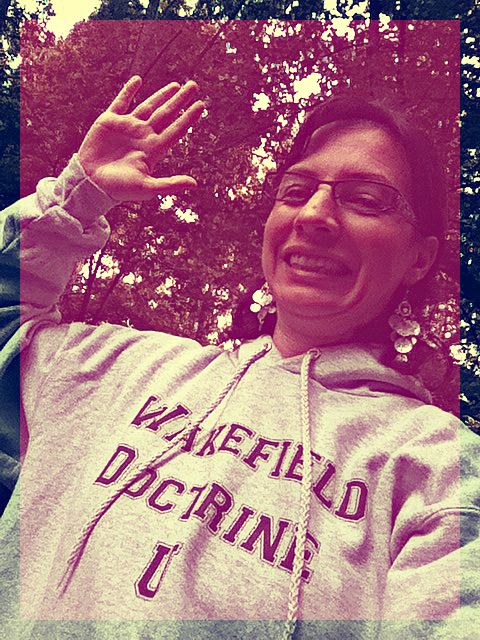Welcome to the Wakefield Doctrine (the theory of clarks, scotts and rogers)

Special thanks to Friend-of-the-Doctrine, Cynthia. (Why, yes, that is a genuine Wakefield Doctrine U. hoodie).
The Wakefield Doctrine is a fun1 tool2.
Like the most fundamental, (and, therefore, arguably useful) tools, it offers a flexibility in application and a simplicity in operation.
The tool, that is the Wakefield Doctrine, is comprised of three moving parts, one conditional assumption, a single qualifying limitation and the ultimate in safe and simple On/Off switches.
Application, (of said tool), is of a variety of multitudes beyond a meaningful quantification.
(It being apparent we’ve run out of synonyms for useful, practical and…what’s the word? oh, yeah, ‘cool, productive and fun’, lets get all bullet pointy on this thing.)
So to the three moving parts:
- clarks (the Outsider)
- scotts (the Predator)
- rogers (the Herd Member)
We are, all of us, born with the innate predisposition to relate to the world in one of three manners/styles/character. And these three ‘styles’ (that other ‘normal’ personality typing schemes and theories refer to as ‘personality type’) we call, ‘predominant worldviews’. Ever body’s got one. And, as a bonus, we never lose the potential of ‘the other two’. The two that did not manifest as our personality type remain a potential influence on our lifes and behavior)
Beneath it all, (the fun and efficacy of our little personality theory), is the phrase: ‘How we relate ourselves to the world around us and the people who make it up’.
Oft under-understood, this phrase has one word that accounts for a) it not quite making the most of the value as a tool for self-improvement and 2) missing out on an opp for self-understanding (oursefls). Damn! We gave it away. If we were in a classroom or lecture hall, one might say to the assembled students-to-school, “We did not say, ‘how we relate to the world’, people, we said, ‘how we relate ourselves to the world’ Big-assed difference. What? No, that last will not be on the exam.”
“This will be on the Mid-term!”
(to be continued…)
couldn’t link into photo-caption, so, ‘Thanks, Cynthia!’
1. fun (n.) “diversion, amusement, mirthful sport,” 1727, earlier “a cheat, trick” (c. 1700), from verb fun (1680s) “to cheat, hoax,” which is of uncertain origin, probably a variant of Middle English fonnen “befool” (c. 1400; see fond). Scantly recorded in 18c. and stigmatized by Johnson as “a low cant word.” Older senses are preserved in phrase to make fun of (1737) and funny money “counterfeit bills” (1938, though this use of the word may be more for the sake of the rhyme). See also funny. Fun and games“mirthful carryings-on” is from 1906.

 About clarkscottroger
About clarkscottroger
Absolutely and unequivocally…what he said.
Excellent cover-ette.
thankee
And of course, the part I read most closely were the etymologies.
ikr?
fun is where the feet notes are